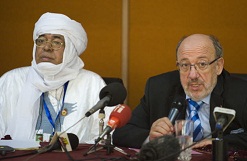NEWS: ACP countries should not be victim of european crisis – ACP-EU Joint Assembly
 Lome, Togo, 22 November 2011/ European Parliament: The crisis should not be used as an excuse to cut development aid, underlined Louis Michel, Co-President of the EU-ACP Parliamentary Assembly on Monday. At the opening ceremony held in Lomé, with the participation of the President of Togo and Niger, he also stressed that security or economic difficulties should not be used as a pretext for reducing democracy after the Arab Spring.
Lome, Togo, 22 November 2011/ European Parliament: The crisis should not be used as an excuse to cut development aid, underlined Louis Michel, Co-President of the EU-ACP Parliamentary Assembly on Monday. At the opening ceremony held in Lomé, with the participation of the President of Togo and Niger, he also stressed that security or economic difficulties should not be used as a pretext for reducing democracy after the Arab Spring.
The Joint Assembly of MEPs and their counterparts from African, Caribbean and Pacific (ACP) countries is focussing its discussions this week on the consequences of the Arab Spring in Sub-Saharan Africa, the impact of indebtedness on development aid and the food crisis in the Horn of Africa. The resolutions will be adopted on Wednesday.
"We have to make sure that developing countries are not made victims of our budgetary restrictions", underlined Louis Michel at the opening ceremony of the Joint Parliamentary Assembly (JPA) of MEPs and MPs from ACP countries. He was particularly concerned that European leaders would come under pressure from the markets "to think short-term only".
Democracy, transparency, security
Referring to an urgent resolution on the consequences of the Arab Spring scheduled for adoption by the Assembly, he stressed that difficulties should not be used as a pretext for reducing aid and that the "democratic aspirations of the people" must not be opposed.
Democracy had progressed in a spectacular way in West Africa in recent years, said Mr Michel. However, he underlined that democratic transitions were "extremely fragile" and "rarely linear" and it was essential that elections should always meet the criteria of transparency.
Mr Michel pointed to Somalia's political and security problems, which must be addressed seriously in order to prevent the problems from spilling over to other countries, such as Kenya.
No more lawless zones
Faure Gnassingbé, President of the host country Togo, stressed that the establishment of a "lawless zone", similar to that in Somalia, must be prevented in the Gulf of Guinea and in the Sahel area.
He said that the activites of the International Criminal Court should be considered "transitional" and every country had to reinforce its judiciary so that it had the capacity to convict those found guilty.
The Acting Co-President of the Joint Parliamentary Assembly, Assarid Ag Imbarcaouane of Mali, drew attention to the worsening piracy situation in the Gulf of Guinea. He also urged the EU to dismantle its subsidies for European cotton producers when reforming its agricultural policy, so to avoid unfair competition with ACP cotton producers.
Proliferation of weapons
In his speech, the President of Niger, Mahamadou Issoufou, listed food security, drought, infrastructure, access to drinking water, democratic governance and the prevention of the proliferation of weapons following the events in Libya amongst the most important issues to be addressed.
The ACP-EU Joint Parliamentary Assembly (JPA) brings together elected representatives of the European Union and the ACP countries, with MEPs and MPs from 78 states that are signatories to the Cotonou Agreement, which is the basis for ACP-EU development cooperation. -END-
(Photo: Co-Presidents of the ACP-EU Joint Parliamentary Assembly, Asssarid AG Imbarcaouane and Louis Michel/ Courtesy of European Parliament)
